Multicultural Canada, Meddlesome India, Maverick Sikhs
There has been no external political influence in India’s general elections by Canada or anyone else and none seems likely. The Canadian poll scene in October will witness a resurgence of Sikh participation and aggressive Indian meddling. For the Canadian government and Sikh-Canadian leadership, it is time to be alert and strong. For those in Punjab, it is time for serious strategic thinking.
![There has been no external political influence in India’s general elections by Canada or anyone else and none seems likely. The Canadian poll scene in October will witness a resurgence of Sikh participation and aggressive Indian meddling. For the Canadian government and Sikh-Canadian leadership, it is time to be alert and strong. For those in Punjab, it is time for serious strategic thinking. Sikhs are over 2 percent in India with a majority of them in their homeland Punjab. Sikhs […]](https://www.theworldsikhnews.com/wp-content/uploads/2019/04/Slider-Flag-360x270.jpg)
Sikhs are over 2 percent in India with a majority of them in their homeland Punjab. Sikhs are nearly 2 percent in Canada with a sizable chunk in Vancouver and Toronto. The number of Sikhs in the Punjab is shrinking and in Canada, United States, United Kingdom, Europe, Australia and New Zealand it is rising by the day.
Two of the seven phases of general elections to the Indian parliament are over and no one has seen any intervention by the Canadian government or any of its citizens.
India sends official delegations to monitor elections to many South Asian and African countries but shies away from any talk by any international body to monitor elections in the country. Even Amnesty International and Human Rights Watch are officially not allowed to investigate violations in Kashmir and Punjab.
“With the upcoming Canadian federal elections, and the active involvement of the Sikh community in Canada’s electoral process, we are even more concerned by the potential of Indian interference.”
What is the political status of the Sikhs in the Punjab? There is no single political party which can be called “the” Sikh political party which vouchsafes for Sikh interests and Punjab issues. We do have Sikh faces as political leaders among many political parties. The total number of Sikh voters is dwindling with the dwindling Sikh population –both in census terms of biological growth and the ‘Let’s go to Canada’ migration movement. As a community we have lost the numbers game, except in some rural areas. The Sikhs are a brutally divided lot. The Sikh leadership in Punjab and the rest of the world is purblind to this.
“Sikhs are closer to their political destiny in Canada than anywhere else.”
Out of Punjab, what is the political worth of Sikhs in India? From the whole country, only one Sikh face from the BJP has been nominated. The physically scattered and leaderless Sikh community has no electoral policy, constituency-wise or state-wise. No national or regional party has shown interests in the Sikhs and Sikhs are also not socially and politically active. The sizeable number of Sikhs in Delhi and Haryana have been manipulated and exploited by the Shiromani Akali Dal for their own upmanship. Politically speaking, Sikhs in India are weak and too dependent on sycophancy.
The Canadian multicultural landscape, equal opportunity paradigm, has provided an environment to the Sikhs, not only to uphold their distinct identity but to emerge as political leaders, responsible ministers, parliamentarians, legislators, bureaucrats, judges and more, displaying high character with exemplary acumen for management and governance.
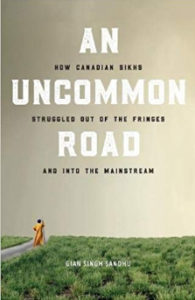
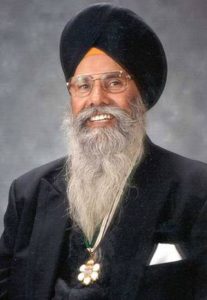 WSO co-founder Gian Singh Sandhu in his book, “An Uncommon Road” documents how in the last thirty years, Sikh Canadians rose from “extremists” to respectable citizens and ministers. He busts many a myth and lie about Sikh leadership and boldly narrates the dichotomy of Indian and Canadian governments and their agencies. He believes that “Sikhs are closer to their political destiny in Canada than anywhere else.”
WSO co-founder Gian Singh Sandhu in his book, “An Uncommon Road” documents how in the last thirty years, Sikh Canadians rose from “extremists” to respectable citizens and ministers. He busts many a myth and lie about Sikh leadership and boldly narrates the dichotomy of Indian and Canadian governments and their agencies. He believes that “Sikhs are closer to their political destiny in Canada than anywhere else.”
 Two years ago, when the Ontario Provincial Assembly adopted MPP Harinder Kaur Malhi’s resolution that, “Motion 47 condemns all forms of communal violence, hatred, hostility, prejudice, racism and intolerance in India and anywhere else in the world, including the 1984 Genocide perpetrated against the Sikhs throughout India, and call on all sides to embrace truth, justice and reconciliation,” India’s External Affairs ministry sharply reacted saying, “we reject this misguided motion which is based on a limited understanding of India, its constitution, society, ethos, rule of law and the judicial process.” When Sikh-Canadian law makers, community leaders and activists puncture India’s image through human rights intervention, an unstoppable storm of protest surges in India.
Two years ago, when the Ontario Provincial Assembly adopted MPP Harinder Kaur Malhi’s resolution that, “Motion 47 condemns all forms of communal violence, hatred, hostility, prejudice, racism and intolerance in India and anywhere else in the world, including the 1984 Genocide perpetrated against the Sikhs throughout India, and call on all sides to embrace truth, justice and reconciliation,” India’s External Affairs ministry sharply reacted saying, “we reject this misguided motion which is based on a limited understanding of India, its constitution, society, ethos, rule of law and the judicial process.” When Sikh-Canadian law makers, community leaders and activists puncture India’s image through human rights intervention, an unstoppable storm of protest surges in India.

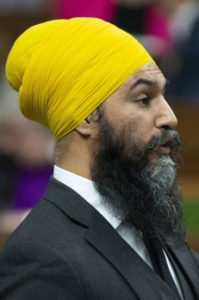 In Canada, what started as lobbying, diplomatic and advocacy campaigns, has now reached a state where Sikhs are more visible in Canadian political life than ever before. The Indian establishment has found it hard to digest turbaned Sikh Ministers and Members of Parliament. The BJP could not accept one turbaned Manmohan Singh as Prime Minister; it was naive to expect that they would go gaga over the humility of Harjit Singh Sajjan or the forthrightness of NDP’s Jagmeet Singh who airs clear views on Sikh nationalism and India’s human rights abuse track record.
In Canada, what started as lobbying, diplomatic and advocacy campaigns, has now reached a state where Sikhs are more visible in Canadian political life than ever before. The Indian establishment has found it hard to digest turbaned Sikh Ministers and Members of Parliament. The BJP could not accept one turbaned Manmohan Singh as Prime Minister; it was naive to expect that they would go gaga over the humility of Harjit Singh Sajjan or the forthrightness of NDP’s Jagmeet Singh who airs clear views on Sikh nationalism and India’s human rights abuse track record.
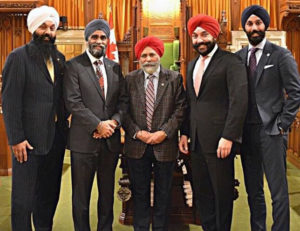 As Sikh Canadians soar high, it is this reach and clout of the Sikhs that worries India, which is why the Indian media and the effusive Punjab Chief Minister shamelessly and deceitfully ridiculed Canadian Prime Minister Justin Trudeau’s visit to Punjab, absolutely unmindful of the possible trade loss.
As Sikh Canadians soar high, it is this reach and clout of the Sikhs that worries India, which is why the Indian media and the effusive Punjab Chief Minister shamelessly and deceitfully ridiculed Canadian Prime Minister Justin Trudeau’s visit to Punjab, absolutely unmindful of the possible trade loss.
Recently when the World Sikh Organisation of Canada expressed concerns about how India may have influenced the wording of the Canadian 2018 Public Safety Report, the Canadian government did not give a complete response. Though Public Safety Minister, Ralph Goodale, under pressure of the Sikhs, removed the ‘Sikhs, Khalistani extremism’ label in the report, the questions that WSO asked, are pertinent even today, “In the first place how did this happen? Who provided this angle to be taken by the Canadian government in the absence of any evidence whatsoever?”
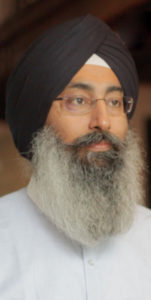 Sikh educator and commentator Harinder Singh of the Sikh Research Institute is forthright. He says, “The Canadian Government should commit to further due diligence in the future. Sikh politicians must work together to form a multiparty Sikh caucus, and Sikh civil servants need to create a Sikh-leaning policy making organization. Each party must establish written platforms on issues important to their Sikh constituents. With the 2019 federal elections on the horizon, Sikh-Canadians must examine all party platforms.”
Sikh educator and commentator Harinder Singh of the Sikh Research Institute is forthright. He says, “The Canadian Government should commit to further due diligence in the future. Sikh politicians must work together to form a multiparty Sikh caucus, and Sikh civil servants need to create a Sikh-leaning policy making organization. Each party must establish written platforms on issues important to their Sikh constituents. With the 2019 federal elections on the horizon, Sikh-Canadians must examine all party platforms.”
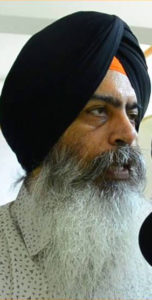 In India, no one so far, except Punjab Chief Minister -Captain Amarinder Singh reacted to the Canadian retraction. Shooting from the hip, he said, “Such an act amounted to endorsement of terror activities and de facto promotion of extremism.” Kanwarpal Singh of Dal Khalsa retorted, “Why does the Canadian government publicly not tell the Punjab CM to keep his hands off Canada in the same way he repeats that Canada is interfering in Punjab? What is Canada afraid of?”
In India, no one so far, except Punjab Chief Minister -Captain Amarinder Singh reacted to the Canadian retraction. Shooting from the hip, he said, “Such an act amounted to endorsement of terror activities and de facto promotion of extremism.” Kanwarpal Singh of Dal Khalsa retorted, “Why does the Canadian government publicly not tell the Punjab CM to keep his hands off Canada in the same way he repeats that Canada is interfering in Punjab? What is Canada afraid of?”
Gurpreet Singh and Gurdeep Singh Kundan of the Global Sikh Council strongly condemned the outrageous remarks of the Punjab CM, terming them, “grossly undemocratic, violation of international human and civilian rights and drive by sectarian ultra-nationalist politics currently at its peak in India.”
“Sikh politicians must work together to form a multiparty Sikh caucus, and Sikh civil servants need to create a Sikh-leaning policy making organization. Each party must establish written platforms on issues important to their Sikh constituents. With the 2019 federal elections on the horizon, Sikh-Canadians must examine all party platforms.”
Since 1984, contemporary history is replete with incidents of the Indian state, Indian agencies and Indian media working overtime to tackle, downgrade and downsize the large strides of Sikhs in the political life of Canada. In this light, Dal Khalsa spokesperson Kanwarpal Singh cautions, “To run down Sikh aspirations and to show Canada and Pakistan in a bad light, India spares no opportunity to accuse Islamabad and Ottawa of harbouring and supporting Sikh insurgents. In the forthcoming Canadian elections, Sikhs will have to be more vigilant than in the past, both in India and Canada.”
Last week, in a third such incident, a Badal Dal-aligned Sikh couple, was detained in Germany on charges of spying on Sikh and Kashmiri communities there and furthering the information to foreign intelligence agency, Research and Analysis Wing (RAW). In Toronto in 2017, the Indian consular office desperately intervened to stop the Punjab Pavilion float in a parade. The Indian High Commission in Canada unabashedly patronises the RSS’s Canada branch. The Air India tragedy enquiry comprehensively documented India’s espionage funding of a section of the Punjabi media.
India’s pretence flew over the lid when former Indian intelligence chief MK Dhar in his memoirs, “Open Secrets” openly talked about how “they” penetrated Sikh ranks, planted stories in Punjabi media and befriended the RCMP personnel. He does not tell us that in 1986-87 several Indian diplomats were asked to leave Canadian shores for their Sikhs-related espionage activities.
“Why does the Canadian government publicly not tell the Punjab CM to keep his hands off Canada in the same way he repeats that Canada is interfering in Punjab? What is Canada afraid of?”
October 2019 is not going to be easy for Sikh Canadians. Sikh ideologue Harinder Singh warns, “The Canadian government’s job is to address risks and ideologies directly. It can do that job even better if its concerns are not party to non-evidence based propaganda from foreign governments. It can instead act extensively to protect all of its citizens from claims and allegations levied by foreign governments at a time when we know Canada’s elections could be susceptible to foreign interference.”
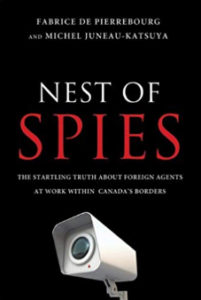 The book “Nest of Spies” by Fabrice de Pierrebourg and Michel Juneau-Katsuya detailing the vulnerability of Canada to foreign influence, including India’s meddling in Sikh-Canadian affairs, perhaps deserves a closer look and corrective action by the Canadian authorities.
The book “Nest of Spies” by Fabrice de Pierrebourg and Michel Juneau-Katsuya detailing the vulnerability of Canada to foreign influence, including India’s meddling in Sikh-Canadian affairs, perhaps deserves a closer look and corrective action by the Canadian authorities.
The Canadian Centre for Cyber Security has warned that, “Foreign countries are very likely to try to advance their agendas in 2019 — a general election year — by manipulating Canadian opinion with malicious online activity.”
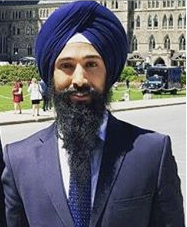 For calling a spade a spade, the World Sikh Organisation of Canada has invariably been attacked by India. WSO President Mukhbir Singh rightly fears, “With the upcoming Canadian federal elections, and the active involvement of the Sikh community in Canada’s electoral process, we are even more concerned by the potential of Indian interference. There is a history of Indian interference and intimidation in Canada and we hope that all steps will be taken to ensure that Canadian Sikhs are not intimidated or pressured by Indian interests. It is of the utmost importance that Canada remains free from foreign interference.”
For calling a spade a spade, the World Sikh Organisation of Canada has invariably been attacked by India. WSO President Mukhbir Singh rightly fears, “With the upcoming Canadian federal elections, and the active involvement of the Sikh community in Canada’s electoral process, we are even more concerned by the potential of Indian interference. There is a history of Indian interference and intimidation in Canada and we hope that all steps will be taken to ensure that Canadian Sikhs are not intimidated or pressured by Indian interests. It is of the utmost importance that Canada remains free from foreign interference.”
Will maverick Sikh activists and leaders in Punjab or Canada sit up tight and plan for the challenges ahead?
